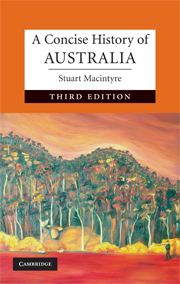Book contents
- Frontmatter
- Contents
- List of illustrations
- Acknowledgements
- Map 1.1 Australia: the main rivers, cities and towns
- 1 Beginnings
- 2 Newcomers, c. 1600–1792
- 3 Coercion, 1793–1821
- 4 Emancipation, 1822–1850
- 5 In thrall to progress, 1851–1888
- 6 National reconstruction, 1889–1913
- 7 Sacrifice, 1914–1945
- 8 Golden age, 1946–1974
- 9 Reinventing Australia, 1975–2008
- 10 What next?
- Sources of quotations
- Guide to further reading
- Index
3 - Coercion, 1793–1821
- Frontmatter
- Contents
- List of illustrations
- Acknowledgements
- Map 1.1 Australia: the main rivers, cities and towns
- 1 Beginnings
- 2 Newcomers, c. 1600–1792
- 3 Coercion, 1793–1821
- 4 Emancipation, 1822–1850
- 5 In thrall to progress, 1851–1888
- 6 National reconstruction, 1889–1913
- 7 Sacrifice, 1914–1945
- 8 Golden age, 1946–1974
- 9 Reinventing Australia, 1975–2008
- 10 What next?
- Sources of quotations
- Guide to further reading
- Index
Summary
A prison situated 20,000 kilometres from the courts that sentenced its inmates was necessarily expensive. Since it was now clear that the cost would not be defrayed by the production of naval supplies, it became all the more important that this distant outpost achieve at least some measure of self-sufficiency. To labour in chains was to hobble productivity, so the colony of New South Wales would be conducted as an open-air prison. To serve time without hope of eventual freedom was to shackle the human spirit in sullen despair, so the penal settlement would have to be something more.
Beyond recognition of these exigencies, the British government gave only limited direction to its new territory. In 1789 France was convulsed by a revolution from which emerged a radical republic that proclaimed the principles of liberty, fraternity and equality as its national ideal and international mission. In 1793 Britain joined a European alliance to put down this revolutionary threat. After a temporary peace in 1802 the former republican general, Napoleon Bonaparte, now Emperor, vanquished all his continental opponents and Britain was left as the sole obstacle to French supremacy. Until the final defeat of Napoleon at Waterloo in 1815, the war on sea and land strained British capacity to the utmost.
- Type
- Chapter
- Information
- A Concise History of Australia , pp. 35 - 52Publisher: Cambridge University PressPrint publication year: 2009



